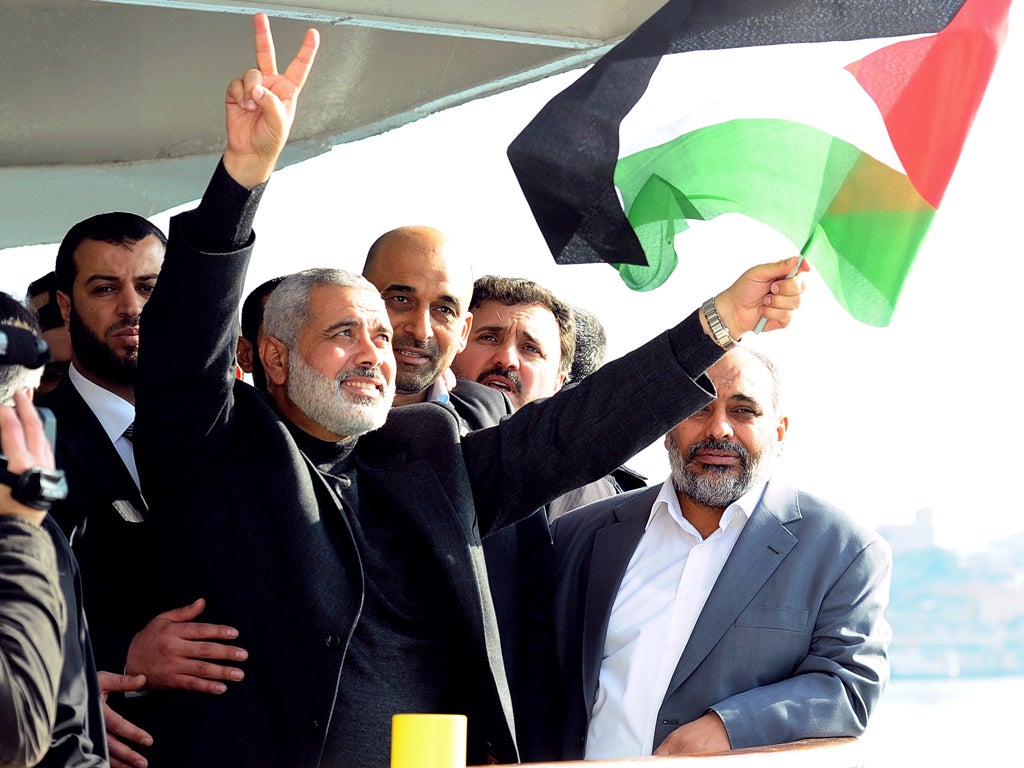Gaza PM stirs tension by boarding blockade ship
Palestinians plan diplomatic blitz to increase pressure on Israel over peace talks

Your support helps us to tell the story
From reproductive rights to climate change to Big Tech, The Independent is on the ground when the story is developing. Whether it's investigating the financials of Elon Musk's pro-Trump PAC or producing our latest documentary, 'The A Word', which shines a light on the American women fighting for reproductive rights, we know how important it is to parse out the facts from the messaging.
At such a critical moment in US history, we need reporters on the ground. Your donation allows us to keep sending journalists to speak to both sides of the story.
The Independent is trusted by Americans across the entire political spectrum. And unlike many other quality news outlets, we choose not to lock Americans out of our reporting and analysis with paywalls. We believe quality journalism should be available to everyone, paid for by those who can afford it.
Your support makes all the difference.Ismail Haniyeh, the Hamas prime minister of Gaza, has toured the Mavi Marmara, the Turkish ship boarded in a deadly raid by Israeli commandos in 2010, in a show of solidarity with the pro-Palestinian activists who attempted to break Israel's blockade.
Mr Haniyeh was visiting Turkey as part of a two-week tour of the Muslim world, his first official trip out of Gaza since Hamas seized power there in 2007, in an effort to drum up regional support in the wake of the Arab Spring revolts.
The Turkish leadership has been highly critical of Israel's policies towards the Palestinians, particularly its blockade of Gaza, stepping up his rhetoric after the Jewish state's botched storming of a Gaza-bound aid convoy in May 2010 left nine Turkish nationals dead. Relations between the countries, once close allies, have never recovered.
"Your martyrs are our martyrs, your blood is our blood, your wounds are our wounds," Mr Haniyeh said in an address to supporters of IHH, an Islamic aid group that organised the convoy to breach Israel's naval blockade of Gaza.
A day earlier, Mr Haniyeh met with the Turkish Premier, Recep Tayyip Erdogan, who welcomed Hamas' efforts to reconcile with Fatah, the West Bank-dominant party led by Palestinian President Mahmoud Abbas, and end a bitter four-year rift that has politically divided the Palestinian territories.
Mr Erdogan said that there could be no Israeli-Palestinian peace if it does not include Hamas. Israel has refused to talk with the Islamist party, which it regards as a terrorist group. The visit came as Israeli and Palestinian negotiators prepared to meet in Amman today in the first contact since peace negotiations collapsed over a year ago, although both sides stressed that it did not signify a renewal of talks.
The Palestinians have refused to return to negotiations so long as Israel continues to build Jewish homes in the occupied West Bank and East Jerusalem. Instead, they launched a statehood bid at the United Nations last year to break a 20-year cycle of fruitless talks with Israel. The bid, however, failed to garner the required support amid Israeli and US accusations that the Palestinians were seeking to sidestep a negotiated solution.
Nevertheless, the Palestinians are preparing a "diplomatic blitz" against Israel, according to the Haaretz newspaper, aimed at bringing pressure on Israel from a variety of fronts. The strategy includes reviving the UN statehood bid; urging the International Criminal Court to investigate Israel for war crimes committed during Operation Cast Lead in Gaza three years ago; pushing the signatories of the Fourth Geneva Convention to debate Israeli construction on occupied territory; asking the UN Security Council to pass a resolution condemning settlements and impose sanctions on Israel; and organising non-violent mass rallies in the West Bank.
Palestinian spokesman Ghassan Khatib confirmed that the PLO Executive Committee had discussed some of these points at a meeting two days ago, but stressed that it was a continuation of the strategy launched by Mr Abbas last autumn.
The Palestinians are expected to press ahead after the 26 January deadline, set by nations mediating the peace process, for both sides to present proposals on security and border lapses. The Palestinians have presented proposals, but Israel insists such issues should be discussed only during direct peace talks.
Join our commenting forum
Join thought-provoking conversations, follow other Independent readers and see their replies
Comments